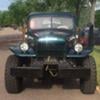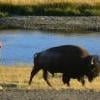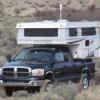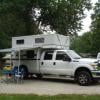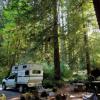I didn't see where else this would fit.
My trip through Yellowstone took us over Beartooth Pass to enter from the East. We camped for the night above Red Lodge, MT at about 6,000 ft, spent the day going up US 212, stopping often for viewing. As planned, after the pass (10,947 ft) I started looking for boondocking sites as it was approaching 6 PM. Found a nice site at 8,000 ft, set up camp and made supper. Simon wouldn't eat (a beagle!). I had to drag him around the small clearing for a walk. He then had trouble navigating the stairs to get back into the camper; I had to help him as his back legs weren't working right.
It finally dawned on me that these are signs of AMS and possibly High Altitude Cerebral Edema. Oh oh! Broke camp in record time (20 minutes) and started downhill to Yellowstone. By the time we got to Cooke City (6,600') Simon was up barking at anything that moved, so he was going to be OK, but I still wanted to get him lower and that close to Yellowstone dispersed campsites are hard to find, especially in the dark. Blew through Yellowstone in the dark, almost hitting a herd of buffalo (45 MPH is too fast to drive there at night and buffalo aren't reflective) and slept at a truck rest area just outside West Yellowstone.
It just never occurred to me that Simon would respond to going uphill too fast. So a word of caution: when planning or executing a trip, your pup can respond to going up in altitude too fast just as you would so it is something to watch for.
jim


